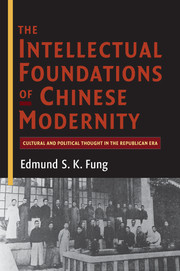 The Intellectual Foundations of Chinese Modernity
The Intellectual Foundations of Chinese Modernity Book contents
- Frontmatter
- Contents
- Acknowledgements
- Abbreviations
- A Note on Romanization
- Introduction
- 1 The Push of Westernized Radicalism
- 2 The Pull of Cultural Conservatism
- 3 The Politics of Modern Chinese Conservatism
- 4 Liberalism in China and Chinese Liberal Thought
- 5 The State, Government and the Rule of Law
- 6 The Rise of Reformist Socialist Thought
- 7 From State Socialism to Social Democracy
- Conclusion
- Glossary
- Selected Bibliography
- Index
- References
Introduction
Published online by Cambridge University Press: 03 May 2010
- Frontmatter
- Contents
- Acknowledgements
- Abbreviations
- A Note on Romanization
- Introduction
- 1 The Push of Westernized Radicalism
- 2 The Pull of Cultural Conservatism
- 3 The Politics of Modern Chinese Conservatism
- 4 Liberalism in China and Chinese Liberal Thought
- 5 The State, Government and the Rule of Law
- 6 The Rise of Reformist Socialist Thought
- 7 From State Socialism to Social Democracy
- Conclusion
- Glossary
- Selected Bibliography
- Index
- References
Summary
Modernity, ‘an unfinished project’, as Jürgen Habermas terms it, has been a subject of considerable interest to intellectuals in the People's Republic of China (PRC) since the late 1980s, with some scholars questioning the postmodernist claim that modernity is dead. In 1997, for example, the intellectual historian Xu Jilin asked rhetorically whether modernity had really come to an end. Certainly not, he said, as far as Chinese modernity is concerned. More importantly, in the same year, a lively debate took place between the liberals (or neoliberals) and the so-called New Left following the publication of the literary scholar and intellectual historian Wang Hui's provocative article ‘Contemporary Chinese thought and the question of modernity’. The article has since attracted a great deal of scholarly attention at home and abroad and has been translated into Korean, Japanese and English. In many respects, the debate was between liberal thought, especially classical liberalism, and socialist thought in the contexts of China's transition to a global market economy and of the social and economic inequalities spawned by the economic reforms. The debate is ongoing, which reminds us of the cultural and intellectual controversies of the precommunist period. There are similarities. Intellectuals of the Republican era wrestled with questions of modernization, wealth and power, liberty, democracy, equality and social justice and contemplated China's place in the world. Contemporary intellectuals, finding themselves in an era of reform and globalization, continue the search for Chinese modernity that had begun three quarters of a century earlier.
- Type
- Chapter
- Information
- The Intellectual Foundations of Chinese ModernityCultural and Political Thought in the Republican Era, pp. 1 - 26Publisher: Cambridge University PressPrint publication year: 2010


